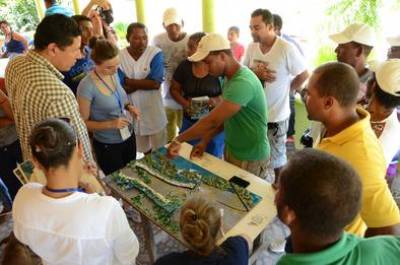Architecture Sans Frontières - UK (ASF-UK) aims to make community and international development issues integral to the practice and teaching of architecture. ASF-UK teaches inclusive, participatory, and empowering methods of working effectively within communities to alleviate poverty and increase community capacity.
In 2009, five organisations, all part of the Architecture Sans Frontières International (ASF-Int) network, came together to develop a learning programme to enable built environment professionals to engage reflexively with the challenges of international development in urban contexts of the global south. Funded through the European Community's Lifelong Learning Programme, the project recognised the need for both a stepping-stone into community and international development, and continued professional development in this sector.
The partnership offered the opportunity to co-create a course that drew upon the varied experience of different organisations and their pedagogic practices. The process enabled the development of a reflexive action-learning methodology where participants engage with the complexity of urban inequality and marginality in a range of different contexts, and through a variety of methods. Oscillating between action and reflection, the course - titled Challenging Practice - is divided into four stages: a theoretical online introduction, a live seminar, an action-based workshop or internship, and finally a last stage of deeper theoretical reasoning.
The paper aims to interrogate specifically the action components of the course in relation to two key questions. On the one hand, the reflection addresses the consequences of exploring urban marginality as a site of learning. Which knowledges need to be connected and negotiated, and how are assumptions about the generalisability of urban knowledge and practice challenged in the interaction with specific locales? On the other hand, the paper seeks to explore the aftermaths of these initiatives in the participants' experience. What are the consequences for them, having being exposed to 'other' urban conditions and 'other' voices in terms of their professional development?
15 minute paper by Beatrice De Carli (University of Sheffield) and Sarah Ernst (Architecture Sans Frontières-UK).
Session three: 17.30 - 19.00, Thursday 17 September, Darwin Lecture Theatre.
Image: Resilience by Design workshop, Cartagena (Colombia), September 2014
 Close
Close


